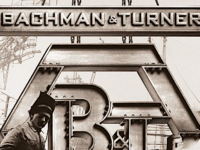Bachman-Turner Overdrive was enjoying their first taste of success with the twin punch hits of “Takin’ Care of Business” and “Let It Ride” when the group entered the studio to record their third album, the one that was supposed to take them to the next level.
Not Fragile, released in August 1974, did just that, producing two more hits. To this day, it’s widely regarded as the Canadian band’s best overall effort.
BTO’s brand of meat ‘n’ potatoes, blue-collar rock stood in direct opposition of some of the artsy prog rock that was at the height of its popularity at the time. Indeed, the title Not Fragile is said to be the answer to Yes’ Fragile. Bachman-Turner Overdrive played up the part to perfection, adding “Overdrive” after a trucker magazine and dressing in regular street garb devoid of sequins, platform shoes and open shirts. And with lyrics anybody older than three can understand. That compliment sounds a bit backhanded, but Bachman-Turner Overdrive at their best executed the game plan to near perfection, and when they did, they were a hell of a lot of fun to listen to.
Never were they executing as well as they were on Not Fragile. I’m not saying every song on here is a winner (truthfully, very few albums are that good), but there’s plenty to justify keeping the 8-track player cranked up in the Firebird – or testing the limits of those big wooden cabinet speakers with the 25-pound magnets in the living room.
That projecting, gravelly vocal of bass player C.F. “Fred” Turner was snugly matched to the monster guitar riffs, and helped to make a road anthem like “Roll on Down the Highway” a perfect slice of diesel-powered hard rock. He also contributed the straight-at-you, bottom-heavy title track, the best deep cut on here.
The unlikeliest success story of the album grew out of a joke Randy Bachman tried to play on his stuttering brother. Taped during the Not Fragile sessions and not intended for anything but some sibling ribbing, the label head listened to it and immediately thought “winner,” insisting it go on the album as-is. An embarrassed Bachman braced himself for the destruction of the band. Instead, he landed a No. 1 hit in 21 countries and Bachman-Turner Overdrive’s only million-selling single. You know that song as “You Ain’t Seen Nothing Yet.”
Randy Bachman’s fingerprints are everywhere. As producer, primary songwriter and co-lead vocal, his contributions were important, but none were more crucial as his guitar work. Revisiting Not Fragile after decades away, it becomes easier to appreciate what a versatile, powerful and, yes, tasteful guitarist this Canadian icon of crushing riffs really is – and on a record that isn’t known for subtleties.
For all the exhibition of prototypical of rock leads like on “Roll on Down the Highway” or “Sledgehammer,” you can find graceful, jazzy picking on the goofy “Rock is My Life, and This is My Song,” and Allman Brothers-like bluesy leads on the Duane Allman tribute “Free Wheelin’.”
That song, the lone instrumental, was contributed by the just-arrived second lead guitarist Blair Thornton, who prior to this was in a band that included the father of famed Vancouver jazz vocalist Heidi McCurdy. As the drummer (and composer of “Roll on Down the Highway”), Randy’s brother Rob wasn’t flashy like that more famous Canadian drummer, but his no-nonsense, powerhouse approach suited the music just right.
When it’s all said and done, Bachman-Turner Overdrive’s Not Fragile is an artifact of its time, but in coming back to this album, it also reminds me of what made that period such a good time for rock music. Back then, hard rock was still rooted in the blues, and BTO – following closely in the footsteps of ZZ Top and early Led Zeppelin – held tightly to that connection between the two related forms of music.
In just three years, Randy Bachman would leave the band and Bachman-Turner Overdrive was, for all intents, finished at that point. But this tough outfit featuring double-lead guitar and no keyboards would leave behind some of the best music of that style, because it was lively, unpretentious and with Randy Bachman at his peak and in full command.
- Roscoe Mitchell – ‘One Head Four People’ (2024) - January 6, 2025
- Cheer-Accident – ‘Vacate’ (2024) - January 3, 2025
- Patrice Rushen – ‘Prelusion’ (1974, 2024 Remaster) - January 2, 2025



